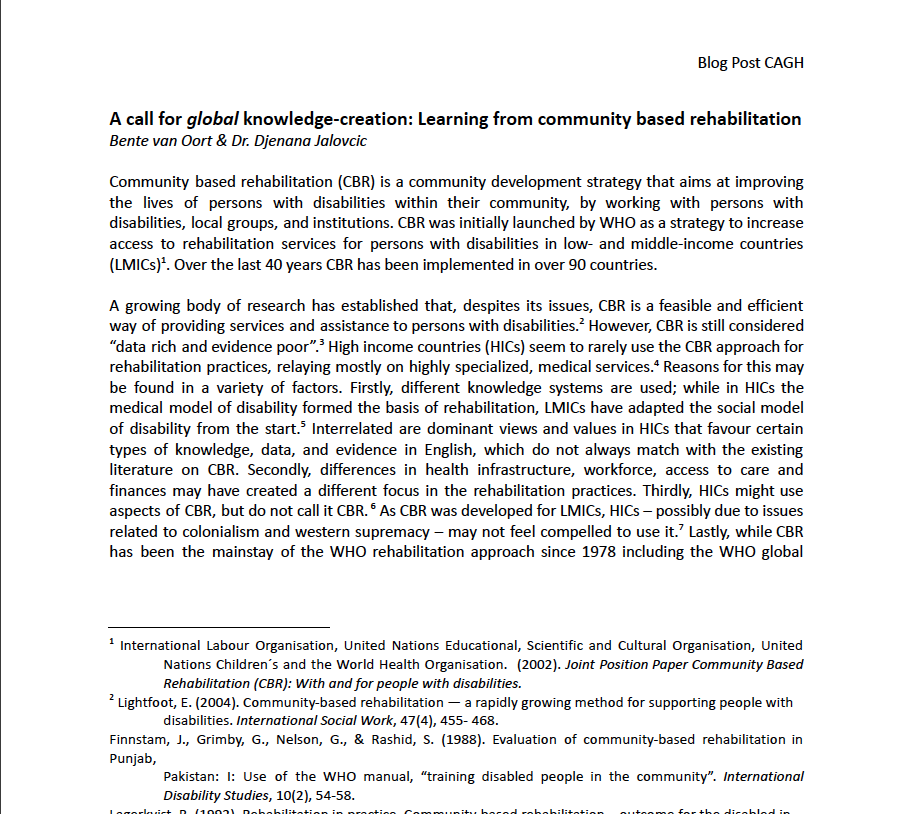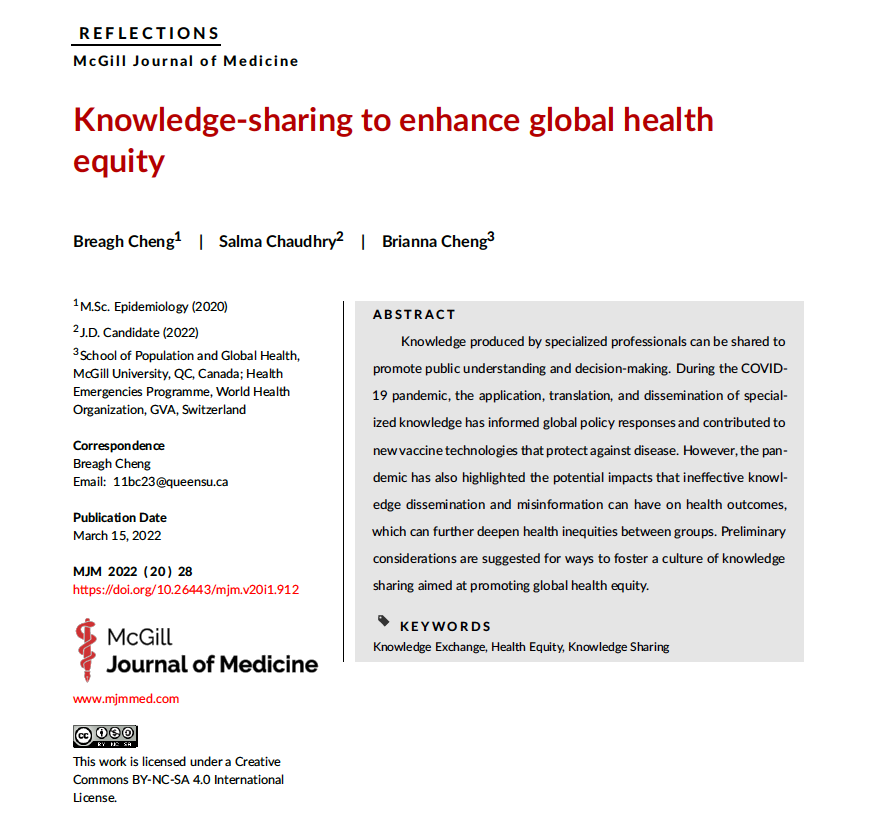Towards global knowledge-creation on rehabilitation – Project By: Bente van Oort, BSc. - Mentor: Dr. Djenana Jalovcic
 In April 2020, we, Dr. Jalovcic and I, met for the first time online as part of the CAGH MentorNet program. What followed were monthly hourlong conversations on a range of topics, including disability studies, immigrant and refugee health and social determinants of health and social justice. But there was one subject we kept coming back to: community based rehabilitation (CBR).
In April 2020, we, Dr. Jalovcic and I, met for the first time online as part of the CAGH MentorNet program. What followed were monthly hourlong conversations on a range of topics, including disability studies, immigrant and refugee health and social determinants of health and social justice. But there was one subject we kept coming back to: community based rehabilitation (CBR).
We found that most knowledge, practice and research on CBR is located in low and middle income countries (LMICs). High income countries (HICs) seem to rarely use the CBR approach for rehabilitation practices. We discussed possible reasons behind this, including different knowledge systems, health infrastructures and attitudes and stance from researchers. But we mostly found that the lack of knowledge-exchange between LMICs and HICs hinders a global approach to knowledge-creation in rehabilitation practice. A global approach to rehabilitation may help to illuminate common principles and challenges around the world, allow for mutual learning and understanding, and ultimately improve the lives of the one billion people with disabilities globally. In an attempt to call for global knowledge-creation, we wrote a blog post that showcases five current challenges to rehabilitation practices worldwide and exemplifies how knowledge from either LMICs and HICs may provide insights and solutions in these issues.
Enhancing knowledge sharing for global health equity – Project By: Breagh Cheng, MSc - Mentor: Dr. Jamie Uhrig, MD
 This final project is a ~1500-word academic commentary on enhancing knowledge sharing for global health equity. Knowledge produced by specialized professionals can be translated to promote public understanding and decision-making. However, various barriers such as lack of training, few systematic incentives for open-data policies, and global gaps in research and development may affect this communication. This is especially timely to consider in the context of the COVID-19 pandemic, given the risks of misinformation that have been demonstrated with notable examples such as the use of unauthorized treatments for COVID-19. Through the application, translation, and dissemination of specialized knowledge, society has developed new vaccine technology and informed global policy responses during the COVID-19 pandemic. This essay highlights several preliminary considerations for ways to foster a culture of knowledge sharing aimed at promoting global health equity.
This final project is a ~1500-word academic commentary on enhancing knowledge sharing for global health equity. Knowledge produced by specialized professionals can be translated to promote public understanding and decision-making. However, various barriers such as lack of training, few systematic incentives for open-data policies, and global gaps in research and development may affect this communication. This is especially timely to consider in the context of the COVID-19 pandemic, given the risks of misinformation that have been demonstrated with notable examples such as the use of unauthorized treatments for COVID-19. Through the application, translation, and dissemination of specialized knowledge, society has developed new vaccine technology and informed global policy responses during the COVID-19 pandemic. This essay highlights several preliminary considerations for ways to foster a culture of knowledge sharing aimed at promoting global health equity.
Intersectionality Module – Project By: Christina Nguyen, BSc, MSc (’22) - Mentor: Rukshan Mehta, BSc, MSc, PhD
The discussion on intersectionality in the global health realm is becoming increasingly important. This module is intended to provide an introductory overview on the concept of intersectionality. Participants will discuss the importance of intersectionality in global health and in everyday life. The articles, videos and educational materials are included to inspire meaningful dialogue on the topic – participant’s experiences, insights and unique perspectives will continue the conversation.
Intersectionality and Global Health – Project By: Nawang Yanga - Mentor: Dr. Zari Gil
The purpose of this module is to familiarize the student and mentor with the theory of intersectionality and its potential applications to global health. The purpose of this module is to advocate for the need to move beyond the traditional social determinants of health (SDoH) to understand how these SDoH intersect to produce and reproduce disparities in health.
